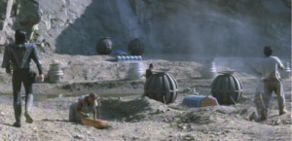Bajor
| Stellar Cartography |
|---|
| Galactic Atlas • Campaign Regions • Spatial Regions • Star Systems • Nebulae • Star Charts |
 Bajor VII is the home of the Bajorans. Its climate is similar to Earth's, but it has an axial rotation of 26 hours.  Originally a Cardassian mining station, Terok Nor was redesignated Deep Space Nine after the Cardassian Occupation and moved to the mouth of the Bajoran Wormhole. Bajor is an M-Class world orbiting a star that is not dissimilar to Sol. It is the 7th planet out of 14 in its system. Its surface is 68% ocean and 32% land. Its gravity is similar to earth. Bajor has 5 moons. The Bajoran day is 26 Earth-hours long. Bajor's location is of great strategic important in the Alpha Quadrant as it lies very close to a stable wormhole. Traffic through the Bajoran wormhole is co-ordinated by the joint Federation/Bajoran administrated space station, Deep Space Nine. In 2388, Bajor became a member of the Federation. GeographyBajor is divided into 8 main provinces that are largely contained within its main continent of Bha’hagh. These are Tozhat, Dahkur, Lonar, Hedrikspool, Musilla, Hill, Kendra and Rakantha.
CommerceBajor enjoys healthy trade of arable crops and mineral resources with the Federation and other, smaller local powers. Federation Intelligence FileBajor enjoyed a healthy and friendly relationship with the United Federation of Planets. After having withdrawn from an approved membership arrangement in 2373 on the advice of Captain Benjamin Sisko, the Bajorans were finally welcomed into the Federation as members in 2388. Bajor’s relationship with Cardassia was repaired in 2371 following a treaty signed by Kai Winn after much of the diplomatic groundwork was laid out by Vedek Bareil. Bareil died during the negotiation proceedings despite efforts by Lieutenant Julian Bashir, Chief Medical Officer of Deep Space Nine.
CultureWeddings and ReceptionsBajoran weddings are spiritual affairs, including readings from scriptures and roles for each member of the spouses' extended family. Wedding receptions tend to be long drawn out parties that can last for days, where neighborhoods are inclined to eat, sleep, dance, and come and go repeatedly until the party calms down on its own. If weddings are scheduled close to other its possible the reception for one will blend into the next. Language
Sources
|





